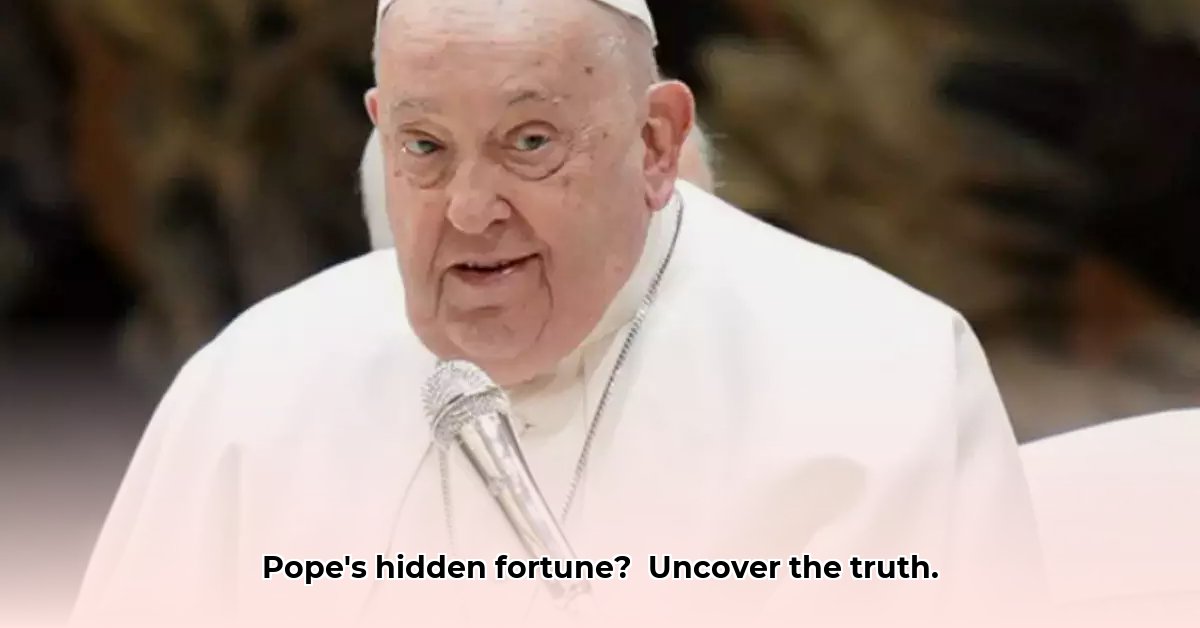
The Paradox of Personal vs. Institutional Wealth
Pope Francis, a figure who embodies simplicity and champions the plight of the poor, leads the Catholic Church, an institution possessing vast wealth. This apparent contradiction—the juxtaposition of personal humility and institutional opulence—forms the core of this exploration. The question we seek to answer is: how does one reconcile the Pope's modest personal finances with the Vatican's substantial assets? Understanding this requires examining both the Pope's personal choices and the opaque yet considerable financial holdings of the Vatican. For more on the Pope's personal wealth, see his net worth.
Francis’s Lifestyle & Choices: A Life of Deliberate Simplicity
Pope Francis's personal life is a testament to his commitment to frugality. Reports indicate his personal wealth is minimal, perhaps only around $100. He has famously refused the substantial monthly salary offered to the Pope, instead opting to donate or redirect those funds to charitable causes. His living arrangements are modest, far removed from the lavish lifestyles associated with some previous Popes. This isn't simply a matter of public relations; it's a deeply ingrained part of his personal philosophy, reflecting his consistent messaging on the importance of combating poverty and prioritizing the needs of the most vulnerable. He actively embodies the values he preaches. But how does this personal simplicity square with the Vatican's financial holdings?
The Vatican's Finances: A System of Intricacies and Opacity
The Vatican's financial holdings are extensive and complex, encompassing real estate, investments, art collections, and other assets spread across the globe. While some financial information is publicly available, a significant portion remains opaque, leading to ongoing calls for greater transparency. The exact value of these assets is difficult to definitively determine due to the unique nature of some holdings (such as priceless works of art). This lack of complete transparency raises concerns about accountability and efficient use of resources. As Pope Francis himself advocates for global financial transparency, these concerns within the Vatican deserve careful consideration. How can this internal opacity be reconciled with the Pope's strong public stance on global financial reform?
A Comparative Analysis: A Break from Papal Tradition
Comparing Pope Francis's approach to finances with those of his predecessors reveals a stark contrast. While previous Popes may not have lived in overt luxury, their lifestyles generally reflected the status and power inherent in their position. Francis's rejection of luxury and embrace of simplicity represent a significant departure from this historical norm. This radical shift in approach is not merely symbolic; it serves as a powerful example, influencing perceptions of leadership, not only within the Catholic Church but across the broader global landscape. This raises the important question: could other major institutions benefit from such a radical shift in the lives of their leading figures?
Wider Implications: Redefining Wealth in Religious Leadership
Pope Francis's financial choices carry far-reaching implications. His actions challenge conventional notions of success and wealth, emphasizing that true riches lie in spiritual fulfillment rather than material possessions. His approach stimulates a broader dialogue about ethical leadership, financial transparency in religious organizations, and the role of the Church in tackling global inequality. His example offers a powerful model for leaders across sectors, prompting critical examination of personal finances and the ethical implications of managing enormous institutional wealth. Does his example inspire similar shifts in leadership in other religious institutions and beyond?
Conclusion: A Testament to Priorities, Not Contradiction
The contrast between Pope Francis's personal simplicity and the Vatican's substantial wealth is not a contradiction, but rather a reflection of his priorities. His personal choices highlight a commitment to serving the poor and living a life of humble service. The challenge, however, lies in ensuring the Vatican’s vast resources are managed with the same transparency and ethical rigor that he embodies in his personal life. Continued research into the Vatican's financial practices and the implementation of reforms are crucial steps toward achieving this alignment. The ongoing effort toward increased financial transparency remains a key area for future attention.